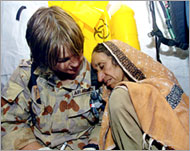Cold kills survivors of Kashmir quake
Bad weather has claimed the lives of at least two earthquake survivors, the first confirmed victims of what officials fear will be a new disaster for the 3.5 million Pakistanis who lost their homes last month.

With heavy rain and snow lashing Pakistan’s part of divided Kashmir, more than 100 people were brought to hospitals with hypothermia and respiratory diseases on Monday.
The bad weather blocked roads and grounded helicopters as troops raced against the approaching Himalayan winter to ferry aid to remote areas devastated by the 8 October earthquake that killed more than 87,000 people.
Three-month-old Waqar Mukhtar died of pneumonia hours after he was brought in from nearby Neelum Valley, said Abdul Hamid, a doctor at a hospital in the regional capital, Muzaffarabad.
|
“If we don’t get people into shelters, they will die. It’s as simple as that” |
In the town of Bagh, a middle-aged man died a day after he was brought in with hypothermia, said Lieutenant-Colonel Johan De Graaf, senior medical officer at the Nato field hospital there.
“If we don’t get people into shelters, they will die. It’s as simple as that,” said Air Commodore Andrew Walton, commander of the Nato disaster response team in Pakistan.
“That’s the second disaster that’s waiting to happen if we in the international community don’t do something about it.”
Walton said it was critical to get more shelter materials and mobile medical teams quickly to high-altitude areas.
Mountaintops in the area have a fresh covering of snow.
Building shelters
Pakistan’s army has said as many as 14 battalions of military engineers are working with volunteers and aid workers in 10-member teams to build shelter homes, with priority given to families who have no male member in the home and are living above 1500 metres.
The army said 18,269 shelters had been completed, with another 4750 under construction.
Hospitals in the quake zone reported dozens of people, mostly children and the elderly, seeking treatment. The situation may be worse in remote areas, where landslides triggered by the precipitation have blocked main roads.
Parveen Ejaz, 26, stood in line outside the Nato hospital with her two sons and two-year-old daughter, all suffering from coughs and colds that she blamed on the weather.
Snowfall
 |
|
Many quake survivors have no |
“I’m really worried about the winter because I lost my house and we are living in tents,” Ejaz said.
The season’s first snow fell on mountains near Muzaffarabad, capital of Pakistani Kashmir, and elsewhere late on Saturday. Downpours and snowfalls continued on Monday.
Major Farooq Nasir, spokesman for the Pakistan army, said troops halted traffic on the main Neelum Valley road “to avoid loss of life” after overnight rain and snow.
Line of Control
Engineers were working to clear the road, which links Muzaffarabad with scores of villages and towns and leads to the Line of Control, the militarised frontier that divides Kashmir between Pakistan and India.
Nasir said no Pakistan army helicopters would fly in the quake zone on Monday because of clouds and rain.
The heavy rains created a near-quagmire in the town of Arja at the camp for a Nato engineering battalion working to clear roads, repair schools and hospitals and get aid to quake survivors at high altitudes.
“It will slow us down, but we will not stop working,” Lieutenant-Colonel Pedro Vallespin said as troops built a boardwalk over the deep mud surrounding his work tent.
Latest tremor
|
“I’m really worried about the winter because I lost my house and we are living in tents” Parveen Ejaz, |
“Just think, if you’re working up there, what it’s like with the mud and the landslides,” Vallespin said, gesturing at the surrounding hills.
A magnitude-4.7 quake was felt on Monday in Pakistan’s southwestern city of Quetta, but there was no word of damage or casualties, said meteorologist Mohammed Jamil.
He said the quake was centered about 300km northeast of Quetta.